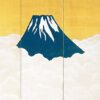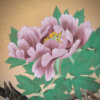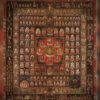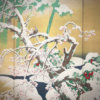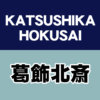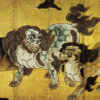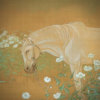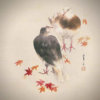Summary | Art History of Japan | Painting | No.6 Post-war – Present Day
Post-war – Present Day
The war ended in 1945 and Japan became a defeated country.
Military involvement in the art world also ceased at the end of the war, and a new era began.
Now it’s time for the final phrase of this lecture.
Let’s look next at what has happened from the post-war period to the present day.
Firstly, the government exhibition, which had been held as the Shin-Bunten Exhibition due to the Matsuda reorganisation, was re-launched in 1946 with a fresh start and the name changed to ‘Nitten’.
At first, various groups were included in the Nitten and tried to work together, but dissatisfaction with the Nitten’s structure and other factors led to defections, and the post-war Japanese art world was divided into three major forces: the Nitten, the Nihon Bijutsu-in and the avant-garde art groups.
Among these, the first post-war commentary was the so-called ‘doomsday of Japanese-style painting’.
What is the doomsday of Japanese-style painting?
This is something of a commentary that arose from criticism towards the Japanese art world of the time.
Until then, Japan was at war and Japanese painters cooperated with the military.
Of course, there was military pressure and they had no choice but to cooperate, but the truth was the truth.
In short, the Japanese paintings were used to agitate the public.
The people were also forced to live a stressful life with many restrictions on their lives, but they still believed in Japan’s victory and put up with the stress.
However, Japan lost the war and the people were greatly despondent.
‘We endured all those hard feelings, but now it’s meaningless.’ So the people felt like that.
Amidst this extremely sensitive mixture of feelings of despondency, post-war anxiety and anger towards the military, Japanese paintings with the atmosphere of pre-war paintings were exhibited one after the other, as if the war had never happened. This greatly stimulated public sentiment.
The people were angry like this.
‘You’ve been showing paintings that incite war, but once Japan lost the war, you started producing the pre-war Japanese paintings again as if the war had never happened.
The people were angry like this.
‘You’ve been showing paintings that incite war, but once Japan lost the war, you started producing the pre-war Japanese paintings again as if those facts had never happened.
What were those war paintings? What is your artistic policy?
You know, paradigm shifts occur when there are big things happen, don’t you?
For example, when the coronavirus broke out, there was a shift towards non-contact activities.
In other case, when the Great East Japan Earthquake hit Japan and a nuclear power plant accident occurred, there was a shift towards renewable energy.
People’s values usually change drastically after such a major event.,However, the people were angry at the Japanese painters who had tried to carry on with their activities without touching on the most significant event of the time, the war and the defeat.
The Japanese people felt that.
‘In the first place, art should be something that captures the hearts and minds of the people, but Japanese painting, which tries to advance without regard to the hearts and minds of the Japanese people, is now a defunct content.’
The criticism of the doom of Japanese painting was born out of the anger of the Japanese people.
Then why did the Japanese painters of the time produce their paintings without any reference to the war?
The reason for this is that the painters who were active before the war (Yokoyama Taikan and other leading figures) were already getting old.
These people had no power left to digest the war within themselves and create new expressions.
Human beings tend to take the easy way out, so they were only able to express themselves as an extension of what they had been appreciated for so far.
In this way, the environment for Japanese paintings continued to be very difficult, but it was the next generation that revived Japanese paintings from such a situation.

